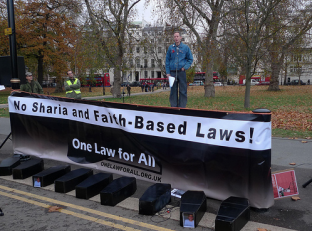Hauwa Ibrahaim is best known for her defense of Amina Lawal and Safiya Hussain, two Northern Nigerian women sentenced to death by stoning for adultery. Ibrahim represents clients in the Islamic shariah courts introduced in the region since 2000.
Hauwa Ibrahim represents clients in the Islamic shariah courts introduced in Northern Nigeria since 2000. She is best known for her defense of Amina Lawal and Safiya Hussain, two Northern Nigerian women sentenced to death by stoning for adultery.
As one of the few female lawyers from Northern Nigeria, Hauwa Ibrahim defends people who are condemned under Shari'ah law. Most of the people she represents are women who are from a poor and uneducated background. In them, she sees a future that could have easily been hers.
Hauwa was born in Northern Nigeria and raised a Muslim. Her father was a Mullah, the person at a mosque responsible for calling the faithful to prayer. In her village, a poor area called Gombe, it was unknown and forbidden for young girls to go to school beyond elementary school. Because her parents could not afford it, Hauwa had to struggle to pay for secondary school, hawking vegetables, fruits and roots to pay for her education. She thinks of her work as returning to humanity what she herself has received, and has worked pro bono on over 100 cases since 1999. She received wide media attention and earned a Sakharov Prize for representing accused adulterers, but Ibrahim prefers to talk about matters closer to home. In her talk, she reflects on her identity as a woman, mother, Nigerian, lawyer and human rights advocate, living in a deeply stratified society. Despite the many distinctions between people, she looks for the common thread of humanity. In her view, religion is the binding factor amongst people because all faiths celebrate the Golden Rule. She also identifies a similarity between Shari'ah law and her work as a human rights advocate: respect for the rule of law.
In my work, I learned to look for those essential values that bring us together as human beings, in spite of our differences in gender, creed, or upbringing. I learned that between a Shariah court and a human rights defender, there is a common denominator that is a belief in the rule of law and justice, and I realized that this common value needs to be the basis upon which any case can be argue. The talk’s fundamental premise is that regardless of one’s conviction and ideology, we can all unite around our common humanity and our common need for justice, fairness, and peace. Behind her story lies, in fact, the confidence that this kind of understanding and appreciation of the values we all share by virtue of our being human is not only possible, but also indispensable. Here are some twitter reactions to Hauwa's talk:
Hauwa Ibrahim: "What we, as human beings, have in common is human dignity." #tedxhagueacademy
— Sanne Meijer (@trickysticky) September 9, 2013
International justice should not usurp local systems of justice. " Hauwa Ibrahim #TEDxHagueAcademy
— EverybodyHatesChris (@ChrisNqoe) September 17, 2013
The resistance and threats that Hauwa talks about in her talk are also replicated online as seen by reactions on this post on facebook:

